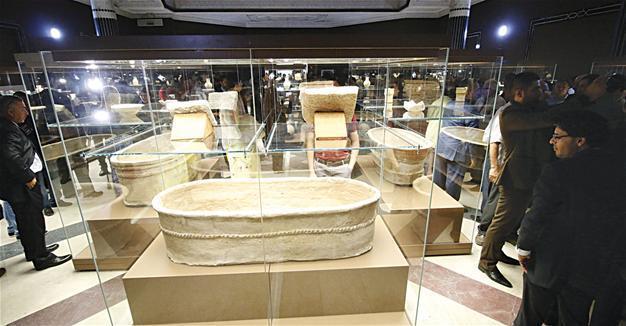Iraq opens new antiquities museum in Basra
BAGHDAD

Iraq opened a new antiquities museum in the southern city of Basra on Sept. 27 with pottery, coins and other artifacts dating back more than 2,000 years on display.
The city’s old museum in Basra’s historic center was looted during the first Gulf War in 1991 and damaged during the 2003 invasion. Fortunately, much of the collection had already been evacuated to Baghdad. The museum’s former director, Mudhar Abd Alhay, was shot dead amid communal violence in 2005.
Only one hall was opened due to a shortage of funds, museum director Qahtan al-Obaid said while speaking to the Associated Press. The museum will showcase artifacts dating back to 400 B.C. that tell the history of the oil-rich city on the Persian Gulf, he added.
Al-Obaid said there were plans to open other wings that would exhibit Babylonian, Assyrian and Sumerian artifacts from across Iraq dating back to 3,300 B.C. Iraq is currently in the grip of an economic crisis linked to the plunge in global oil prices and the war against the Islamic State of Iraq and the Levant (ISIL).
The museum is housed in one of Saddam Hussein’s former palaces, which had briefly served as a mess hall for British troops after the 2003 U.S.-led invasion that overthrew him.
Al-Obaid said the location was chosen in order to “replace the themes of dictatorship and tyranny with civilianization and humanity.”
Al-Obaid has recruited 40 volunteers to assist the museum, a rarity in the Middle East. He hopes that the institution’s education facility will become “a cultural center” for the region. He also plans to make up for the museum’s lack of archaeological material by encouraging excavations to provide additional finds for display.
Funded by UK charity The museum was conceived in 2008 after the British withdrawal, and was partly funded by a U.K. charity. The hall that opened earlier this week cost an estimated $750,000, of which $500,000 was provided by BP, which operates in Basra, al-Obaid said.
Basra has been inhabited for thousands of years, but the current city dates back to 637. It flourished during the Middle Ages as an important cultural and commercial center of the Abbasid Empire, and was the departure point for Sinbad the Sailor’s fictional adventures in Africa and South Asia.
Iraq’s oil-rich south is far from the front lines of the war with the ISIL, which has destroyed ancient sites in northern Iraq and neighboring Syria.
 Iraq opened a new antiquities museum in the southern city of Basra on Sept. 27 with pottery, coins and other artifacts dating back more than 2,000 years on display.
Iraq opened a new antiquities museum in the southern city of Basra on Sept. 27 with pottery, coins and other artifacts dating back more than 2,000 years on display.